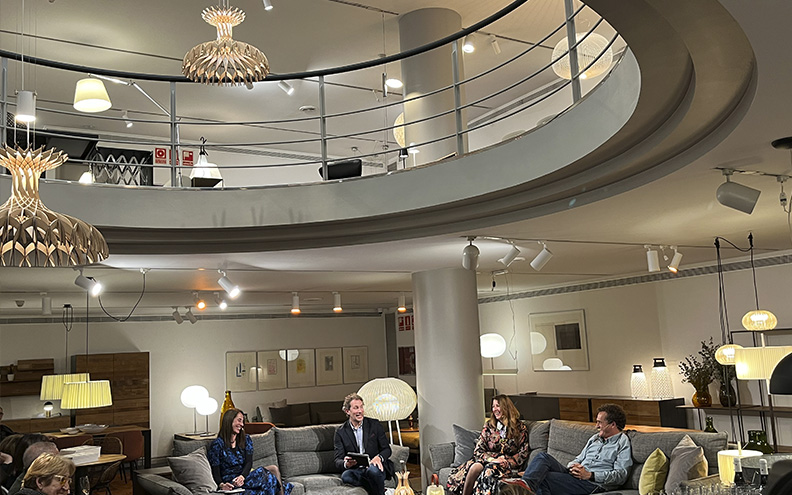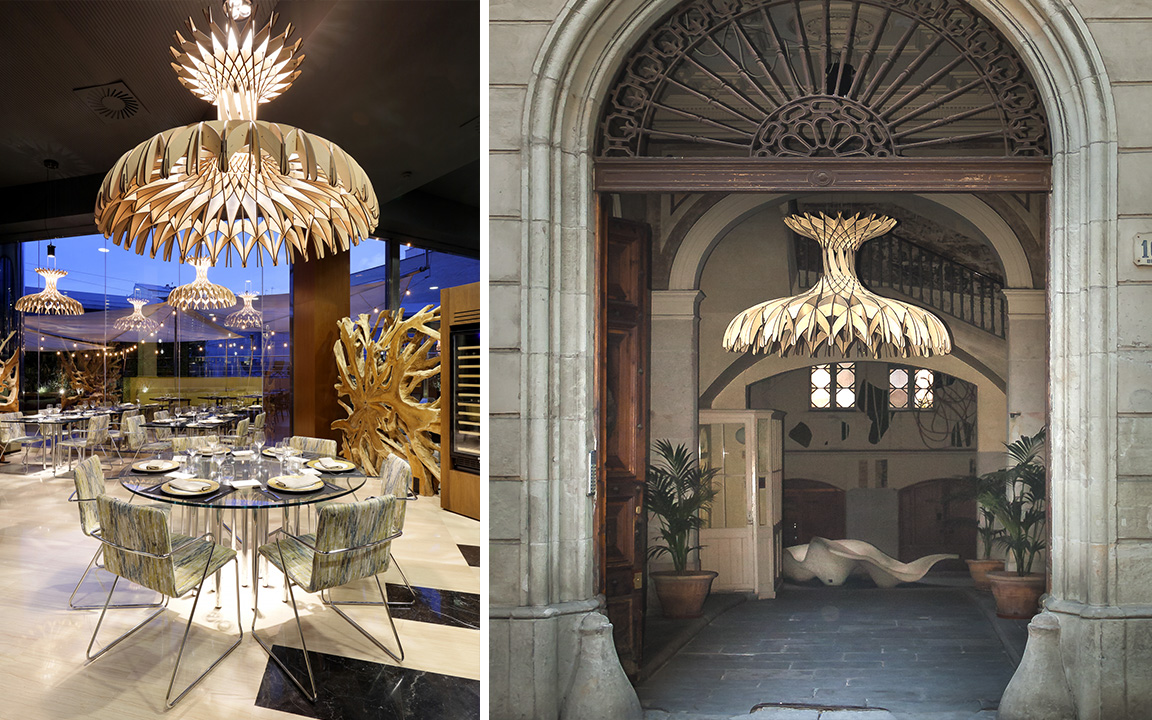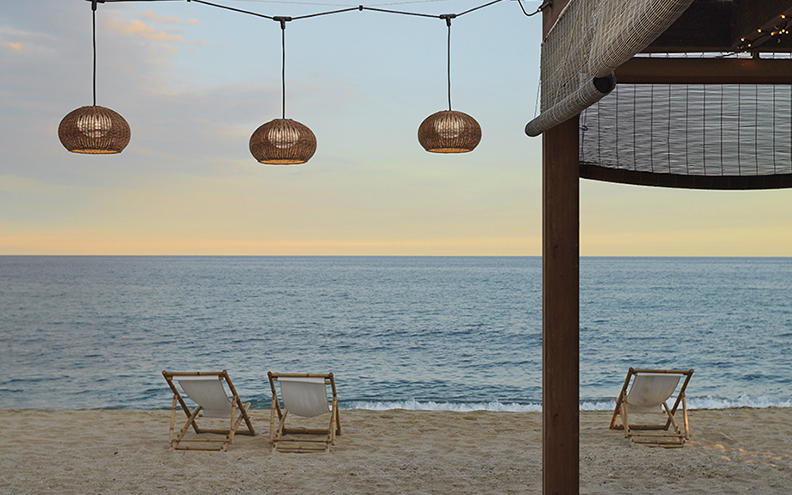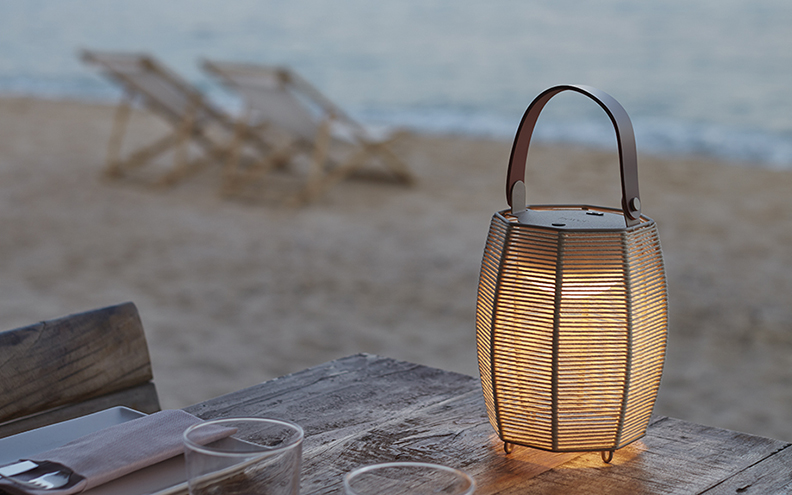Since the existence of the seas and coasts, the Mediterranean Sea has been special. Through different looks, and in Pilma, we pay tribute to its light and what it is capable of creating
There is a link between the towns and cities of the Mediterranean that unites them. One that exists thanks to a special connection between it and its inhabitants. And in the rocks, the sea, the forests, the meadows and the lakes; the light of the Mediterranean. And not only that connection, but the need we have for it, even if we are not aware of it during all hours of the day.
On April 27th, a talk was organized by the Catalan lighting firm Bover at the Pilma space in Barcelona, with the participation of architect Benedetta Tagliabue, designer Gonzaló Milá, lighting designer Jordi Ballesta and creative director Joana Bover.

From left From right: Joana Bover, Jordi Ballesta, Benedetta Tagliabue and Gonzalo Milà.
The talk, which was organized at sunset, focused on The object of light in Mediterranean. Joana Bover was the first to express, why, light is equally important for your day-to-day life at home, at work or outdoors. And she explained how light is essential in all its forms.
“The light that enters through the windows, these typical Alicante windows, how we mount them, how we move them away, how we let the light in. I’m not talking about lamps, but purely natural light, it’s very important”.
This was characterized by being an informal, fluid, natural and fun chat, in which questions and answers, experiences and professional advice and explanations were intertwined. Gonzalo Milà, explained that: .
light for him was the same for all cultures because we all have day and night and at night you have to replace natural light with artificial light and this must be of high quality;
But he made one essential thing clear: the light, we carry it inside us.
Benedetta Tagliabue, originally from Lombardy lovingly recounted her origin with fog, rains explained and that the Mediterranean had stolen her heart, she described it as a dream:.
It depends on where you are born, the incidence of the sun, the light, you have a type of life and aesthetics or another.

The light and architecture of one of the most emblematic places on the Mediterranean coast, Mallorca.
The value we place on light is what makes us special.
And it is true, since we Mediterranean people give an incredible value to light, it is a way of life that makes us special. Although we seem to have routinized the lack of sunlight in the evenings, when we continue to perform tasks, the important factor, which the designer Milà mentioned, is the following:
“At times when you have to supplement natural light with artificial light, that’s where you have to have quality.”
Light also has a magical point, a sparkle that is difficult to explain and, sometimes, to understand. It was exposed, during the talk, a very interesting connection, which related light objects, physical and tangible, with light, something so intangible and subjective.
“Being an architect is a fantastic and precious way to give aid to light.”
– Benedetta Tagliabue

Wooden lamp ‘Dome’ created by Benedetta Tagliabue for Bover
The awareness that light is something that, in reality, does not exist and that invades us constantly makes designers, architects and lighting designers have to look for a container that, when it is dark, illuminates, but that looks like there is no light. That is natural and that, above all, people are comfortable at home. Gonzalo Milà, made reference to this topic explaining that: “We increasingly need light when there is none, because of the way we live, because of how we have broken the Mediterranean rhythm, because of how we need to do things when we should be sleeping”. .

Garota lamp designed by Gonzalo Milà for Bover
And the fact is that, although work, working hours and stress make us daily to daily the light that the whole Mediterranean region is endowed with, sometimes you have to stop, look at it and show that a slow life in rhythm with light and shadows, is what has characterized the spaces of our life for, not only years, but centuries.
The unconscious embodiment of our light objects at home
Joana Bover related this sensation by personifying the light objects in a house. The first thing we do when we get home is turn on that lamp and it is a way of thinking “I have arrived home”. Lthe other experts, agreed that Bover lamps perform that function.
“I don’t like cold lights, I like things more organic and I love that they are woven, I love the crafts and we must recover them. And if they are of proximity, always better”, explained Bover..
Likewise, creating and designing objects without people living in those places is useless. And each of the participants expressed how important the people who consume their products are to them;

Tanit’ lamp by Gonzalo Milà for Bover
“For anything you do, the most important thing is the person. If he can’t use it, there is no point in creating it.” Explained Milà, since the first thing he thinks about when he is designing a product is where it will be, what use it has to have, and comply, what dimensions it has to have, since everything, absolutely everything, is aimed at the person and how it works.
“People are fundamental, you always identify the person and you do it to improve the lives of the people you are designing for, the world changes, and people and products change. Dynamism makes our work never end.”
Benedetta Tagliabue said that for her, who considers herself a designer of spaces, people are the axis from which to create an environment, a product or even a sensation.
“A very clear example is the Centre Càlida, in Barcelona. A center designed for people who are sick, the light, the wood, the plants; it is an architecture designed so that the people who live there are happy”.
Joana Bover affirmed the importance of this center, since its central axis is people and their care;
Technology and craftsmanship, yes it is possible
And, of course, the topic of technology and its progress was present towards the end of the talk, involving all attendees in an interesting and necessary debate in the world of decoration, architecture and design.
The firm Bover, bets a lot on technology, although the warm Mediterranean touch (Balearic), is always present. Joana commented that for this reason the pieces are a little more expensive and that we are, precisely now, at a point of change, acceptance and testing. LED bulbs are increasingly present in our environments; homes, work or leisure spaces. Even so, that analog and romantic thing is still within us and that gesture of changing the bulb, as Joana Bover explained, we have not yet completely overcome it. If an LED light, for example, breaks down, it is much more expensive to replace it than a conventional bulb. But, on the other hand, as the designer said, I am heartbroken, because I myself miss the bulb, but LED manufacturers are betting that every time, these, have a very long life. In addition, the lighting Jordi Ballesta, commented on the ecological impact of conventional light bulbs: the impossibility of recycling them, how dangerous they are for the environment and for people’s health.

Nans suspension model by Bover
Changes are costly and, often uphill, they are necessary and, most of the time, beneficial. The technological change in the most artisanal sectors and with its own personality may seem aggressive. But as long as the essence does not change and we always keep it in mind, we can only create better, original and own pieces, objects and designs.
Because light creates, illuminates, invades, makes you feel at home, gives warmth and happiness. And giving value to that light creates that precious circle of the Mediterranean. The one that must always be preserved.



